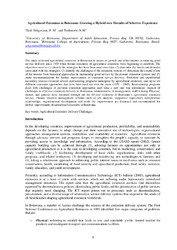Agricultural extension in Botswana: growing a hybrid over decades of selective experience
Abstract
The study reviewed agricultural extension in Botswana to assess its growth and achievements in ensuring good service delivery since 1935 when formal structures of agricultural extension were beginning to establish. The objectives were to (1) identify the strategies that have been used over time; (2) determine the merits and demerits associated with the strategies; (3) identify the challenges of the extension system; (4) determine the extend of use of the lessons from historical approaches in maintaining good service by the present extension system; and (5) make recommendations for further improvement of extension service delivery. Published and unpublished secondary sources revealed several restructuring programs undergone by agricultural extension, and up to six different extension approaches that have been tried out over the years (1935 – 2005). Restructuring programs dealt with challenges of previous extension approaches each time a new one was introduced. Aspects of challenges to effective extension delivery in Botswana: administrative or management, staff training, Physical, farmer, and general, have persisted through out the 65-year evolution of Botswana’s agricultural extension service. Human resource management reforms such as job analysis, supportive supervisory interpersonal relationships, organizational development and work life improvement are discussed and recommended for further improvement of agricultural extension in Botswana.
Collections
- Research articles [58]

